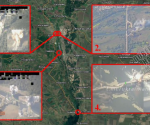Trump’s Afghanistan “surge”: desperate measures for desperate times
All the good analysts on the internet were wondering where the next war was going to be; they understood that the Western military industrial complex needs conflict, and Western corporations need resources just as a pestilence of locusts must always be on the hunt for a bounteous field upon which it can descend and consume. Additionally and somewhat overlooked by all but the very astute, the West needs never-ending clientele for the service sector that its industry is mostly comprised of – this means uprooting people and turning them into refugees. The added bonus for the plan for world government is that the great movement of humanity caused by war “undermines national homogeneity”, as Sutherland infamously put it.
Trump duly announced that there would be an escalation in Afghanistan – not the brand new war that everyone expected, but perhaps on hindsight they should not have anticipated anything else. Trump gave as his excuse the danger that Afghanistan represented in terms of its harbouring al-Qaeda – which is pretty much the same one that Bush gave after 9/11, and really should be the last nail in the coffin of Make America Great Again Trump mythology. As was covered before at FBEL, it is the Taleban that is in the ascendancy in Afghanistan, and the reason for American concern. Granted, Trump also mentioned the resurgent mujahedeen as a target, but as in 2000, the Taleban is no actual threat to the USA. But the Taleban, as it did back then, does present a menace to the US’s empire if it can deny resources – and of course one automatically thinks of the opium crop that the Taleban had banned prior to the attack on the World Trade Centre, and which recommenced after the invasion of Afghanistan.
If the premise for a “surge” is entirely transparent, it is because the US government, or rather the cabal that runs the Federal Government (which, by fraud, rules the States) out of London and Washington, find themselves in a weak position. In short, there cannot be a war elsewhere, even though there has been some stunning propaganda that would clear the way for it. There cannot be a war elsewhere because the London/Washington New World Order is militarily on the retreat. Its enemy has outperformed it. It sounds quite the remarkable claim, but thanks to this weakness it looks like the US government has had to pick the fight at which it thinks it has the best chance of success. Having had to, then, fall back on the longest running conflict in US history, a predicament naturally presents itself to the Trump regime: a limp pretext for more war in Afghanistan has not been developed as fully as the muscle-bound Syrian chemical weapons lie, or the bulked-up North Korea ICBM stupidity.
In this last month, and for the second time in a quarter, a US Navy vessel was hit by a container ship. The first was the USS Fitzgerald. In June, it was struck by Merchant Vessel ACX Crystal off the coast of Japan. The second, the USS John S. McCain was rammed by the MV Alnic MC off the coast of Singapore in August. That two Arleigh Burke-class guided missile destroyers could suffer the same identical humiliation within 3 months of each other is surely something that statistically isn’t possible. High ranking officers have been dismissed; the intention no doubt is to make the two incidents look like a problem with command – additionally, “tiredness” of the crew was touted for gullible Western consumership. But none of this cuts the mustard. A revelatory piece of information was offered in the aftermath:
Earlier, another US Navy official told CNN there were indications the destroyer experienced a loss of steering right before the collision, but steering had been regained afterward.
Swift lauded the “damage control efforts of the crew,” such as helping injured sailors and fighting to control the flooding and stability of the ship.
“John S. McCain was up and running as an operational ship almost immediately after the collision. It was quite extraordinary,” he said.
(Source).
If the crew of the USS McCain couldn’t steer the thing – and apparently a reserve capability to manoeuvre was also unavailable – then it suggests that the vessel was dead in the water. Container ships are huge lumbering things that aren’t easily manoeuvred, so if another ship is stranded in one of these giant’s path then one would assume that warnings would want to be given as early as possible. In fact, if the USS McCain was crossing busy shipping lanes and it became stranded, then surely it would want to know as soon as possible if anything was bearing down on it? Is a complete systems failure the explanation?
Some observers and analysts think so, and further believe that the real reason for the operational collapse of the Fitzgerald and McCain at critical moments has been demonstrated for all in the world to see – and on numerous occasions.
In April 2014, the USS Donald Cook, another Arleigh Burke-class vessel, was rendered dead in the water while Russian planes simulated attacks over again. This is retailed in western media as Russian SU-24s “buzzing” a ship whose compliment could have retaliated if they wanted to. A year later, the Donald “Duck”, as it has become known, was “buzzed” again in the Baltic Sea: “Russian jets made 20 passes of the American ship and flew within 1,000 yards at an altitude of just 100 feet.” Meanwhile a Russian helicopter casually circled the vessel taking photographs.
In June 2015 the US Navy had to deny reports that yet another Arleigh Burke-class vessel, the USS Porter, had been “chased off” by Russian fighters in the Black Sea:
A U.S. guided missile destroyer was buzzed by four Russian military aircraft last week – with one coming as close 200 yards – in incidents the Navy has deemed, “unsafe and unprofessional,” a U.S. European Command spokesman told USNI News on Tuesday.
Three incidents in which Russian aircraft made low passes occurred on Feb. 10 while USS Porter (DDG-78) was operating in international waters in the Black Sea, Capt. Danny Hernandez told USNI News.
(Source).
The evidence might well be accumulating to suggest that the Russians have a technology which makes the highest-tech of the US Navy obsolete at the drop of a hat. Indeed, the chatter is that the crew of the Donald Duck were so dispirited by their initial experience that they tendered their resignations upon arriving back at port. And of course, it was the USS Porter that fired some of those cruise missiles into Syria after the Khan Shaykhun false flag. Its accomplice that night was the USS Ross, another Arleigh Burke-class vessel. Famously, only a few handful of these missiles reached their destination – the chatter says that the strike was interfered with by advanced Russian jamming technology, and FBEL reported at the time that it represented a major defeat for the US government.
The phenomenon of a Russian super-weapon has been roundly laughed-at in the perception-shaping media of the West. Instead, the possibility of “hacking” has been floated. This way the two container collisions might be pinned on a form of warfare, a cyber attack, further down the line, and it might be useful in terms of propaganda for building public consent for conflict (on the other hand, if a foreign power is able to create a field in international waters whereby a US ship is disabled if it happens to wander into it, then defining this as an act of aggression might be a stretch). Additionally, a cyber attack is safe to talk about in the public arena otherwise a BBC-mind-controlled population might be demoralised by news that the Russians can disable the mightiest military machine on the planet with flick of a switch – especially after all the demonization of the “evil Putin”. The victors write history, and in the 20th and 21st centuries a playbook has emerged whereby the “Hitler” character is always on the losing side. But perhaps not this time. Arguably the London/Washington Empire has at last run up against an opponent that has severely reduced its options. And Afghanistan is the easiest of those remaining?
Not really. It has already been mentioned that the corporate-media won’t be able to sell more war in Afghanistan like they might have been able to in Syria or North Korea – and this means not being able to sell it to the US military forces who essentially voted for Trump on a non-interventionist ticket. Polls show that a majority of career-oriented service personnel voted for Trump – and therefore for a promise of an end to foreign entanglement. These people are now potentially going to be on the rough end of Trump’s betrayal. If this turns out to be particularly nasty – and indeed the Taleban have promised to make Afghanistan live up to its reputation of being the graveyard of Empires – then who knows what sort of resentment is going to emerge or how it is going to manifest itself. One of these days it is going to occur to the peace-minded elements of the US military that the only way that they can stop the never-ending war, and the unnecessary risk to their life and limb, is to arrest the entire power structure from the generals upwards. Of course, a full scale revolt is hardly on the cards, but perhaps a Vietnam-style demoralisation and malaise is entirely possible (here is a good reason for using mercenaries in Afghanistan, as has been talked of, but then this brings its own problems like a lack of accountability and public reaction and political consequences). Even the “easiest” option is far from a guaranteed win for the London/Washington cabal; any quagmire will lead to further, potentially lethal complications. The cabal must be desperate. No wonder North Korea has, like the Taleban, started talking about the demise of the Empire.


















